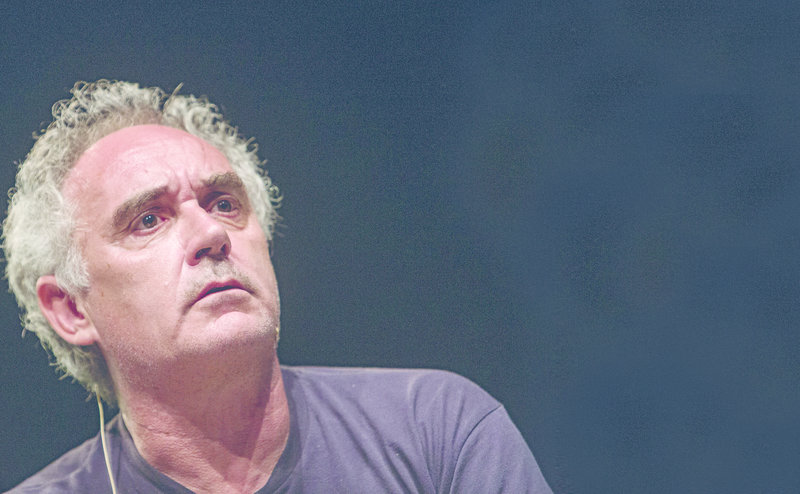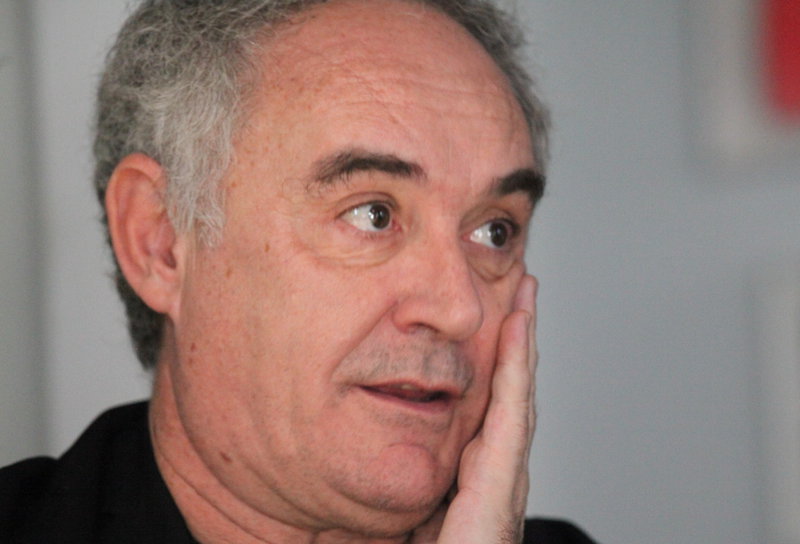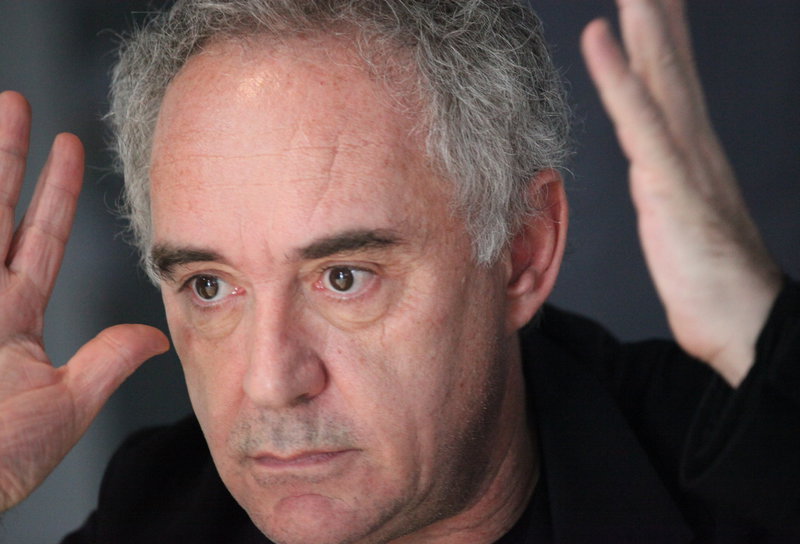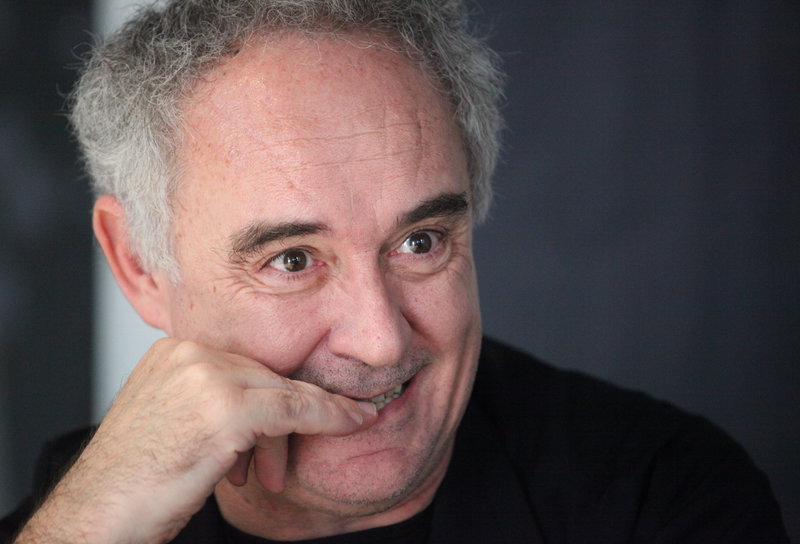Interview
Ferran Adrià
Ferran Adrià
Ferran Adrià (L’Hospitalet de Llobregat, 1962) is one of the world’s great chefs. After closing his El Bulli restaurant, he now focuses on creativity, his El Bulli Foundation, and his new project in Cala Montjoi. We spoke to him when he guested at a ’Sopars de Girona’ event, a meeting of Girona people living and working in Barcelona
El Bulli Foundation has two visions: to preserve all of the El Bulli legacy and to share our experience in innovation and creation
El Bulli 1846 will be incredible! It will be spread over 5,000 square metres, more than the Macba or the Dalí Museum
Why did you close down El Bulli in 2011, when you were on top of the world, and receiving the most distinguished awards and recognition?
From the beginning, our vision and objective was to reach the limit of what the table experience could offer. Therefore, one of the main reasons we stopped is that we realised we couldn’t go any further.
So it’s not because you got tired or because of a lack of passion?
I am passionate about cuisine, but I also have a passion for learning! I am a chef and my job is innovation. I think I have a certain ability for the analysis of cuisine, creation and innovation. If you learn, you keep coming up with new projects.
And how does that happen?
Let’s start from the beginning. Some 22% of small Catalan companies don’t last for more than two years. And 50% don’t last for more than five years. The great economic problem we have in Catalonia is bad management in micro and small businesses. It is horrible. And don’t think it is any better elsewhere in Europe or the US. In society today, we have not learnt to understand that if a young person wants to set up a restaurant, they not only need to know about wine and food, but also -and most importantly- about how to run a business. They don’t know what a business is!
So you see El Bulli Foundation as a possible tool for helping to overcome these obstacles?
The El Bulli Foundation project has two visions: to preserve all of the El Bulli legacy and to share our experience in innovation and creation, to improve efficiency in innovation. In El Bulli, we changed society’s relationship with the world. And the spirit of Juli Soler will always be with us.
What will the recently approved ElBulli 1846 be like?
It will be incredible! It will be spread over 5,000 square metres, more than the Macba or the Dalí Museum. It is a unique venue conceived of as an entertainment centre about the environment of gastronomy in evolution. The foundation is private and without any public contribution, with an investment of seven to eight million euros, which is why it was postponed for so long. The concept of the project is also three years late, as it has evolved over time. We spent five years researching innovation and working with the best experts in the world.
What have you been working on exactly for the past few years?
We’ve been developing projects with the best hostelry organisations in the world. With Esade we’ve done projects on creative auditoria, which is a tool used at El Bulli to evaluate the capacity for innovation, projects with the Roca Brothers, Sant Joan de Déu and Hewlett-Packard. There is still a lot to be done. We believe in online education, especially in MOOC (Massive Online Open Courses).
What do you think of TV shows like MasterChef, which aim to bring cuisine to a general audience?
I watch little television, just about only documentaries. Even though nowadays we can choose entertainment... Yet, I am a great defender of MasterChef, even if they criticised me a lot for it at the beginning. The reason is simple. I’ve never found one mistake related to cuisine in this programme. If you ask yourself how long it took humans to master fire, is that an intellectual challenge? Not at all. In order to understand what cuisine is, you need to understand human evolution. In three years, some 10,000 people visited our Bulligrafia, –our archive-museum developed by elBulli restaurant’s creative auditoria. Among them were six Nobel prizewinners, businessmen, CEOs, intellectuals, professors, scientists, a little bit of everything. None of them could give me the right answer. The fact is that human evolution took some 2.5 million years after the arrival of the first homo habilis. On the other hand, humans needed some 1.5 million years to master fire (from the first evidence of the presence of fire, some 1.9 million years ago, until humans managed to master it, some 400,000 years ago).
You often talk about the history of civilisation. Why is that?
In order to contextualise and understand it better. Five thousand years ago, in Mesopotamia, the first civilisation with relevant social classes emerged. There were the rich and the poor. The rich ones
El Bulli’s legacy
Enric Calzada
I still can’t step foot in France; we have a kind of a understandable love-hate relationshipThis generation is much better than I was at their age. Their training is amazing. But we need to make them understand how a business works
Best chef in the world, according to Restaurant Magazine, and with three Michelin stars, Ferran Adrià began his journey as a cook working in various restaurants from 18 until he became head chef at El Bulli in 1986. A year later, the restaurant’s philosophy changed towards his own Mediterranean vision of haute cuisine. In 1990, he and his business partner Juli Soler began their great adventure. In 2011, he set up El Bulli Foundation, which aims to preserve El Bulli’s legacy.
Leave a comment
Sign in.
Sign in if you are already a verified reader.
I want to become verified reader.
To leave comments on the website you must be a verified reader.
Note: To leave comments on the website you must be a verified reader and accept the conditions of use.








